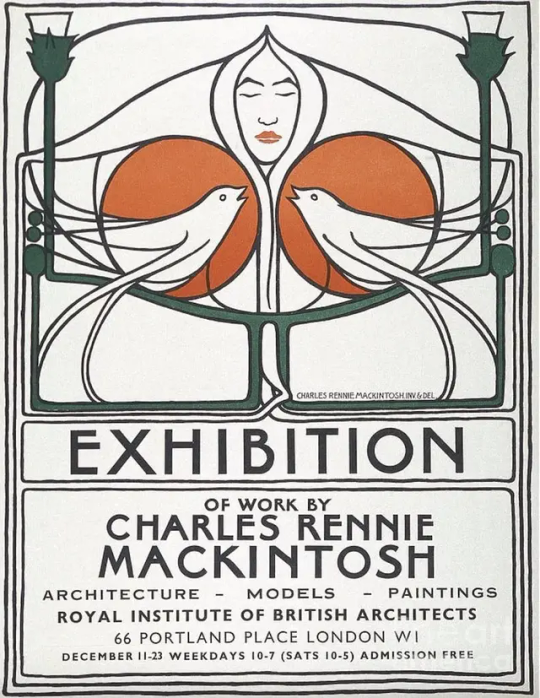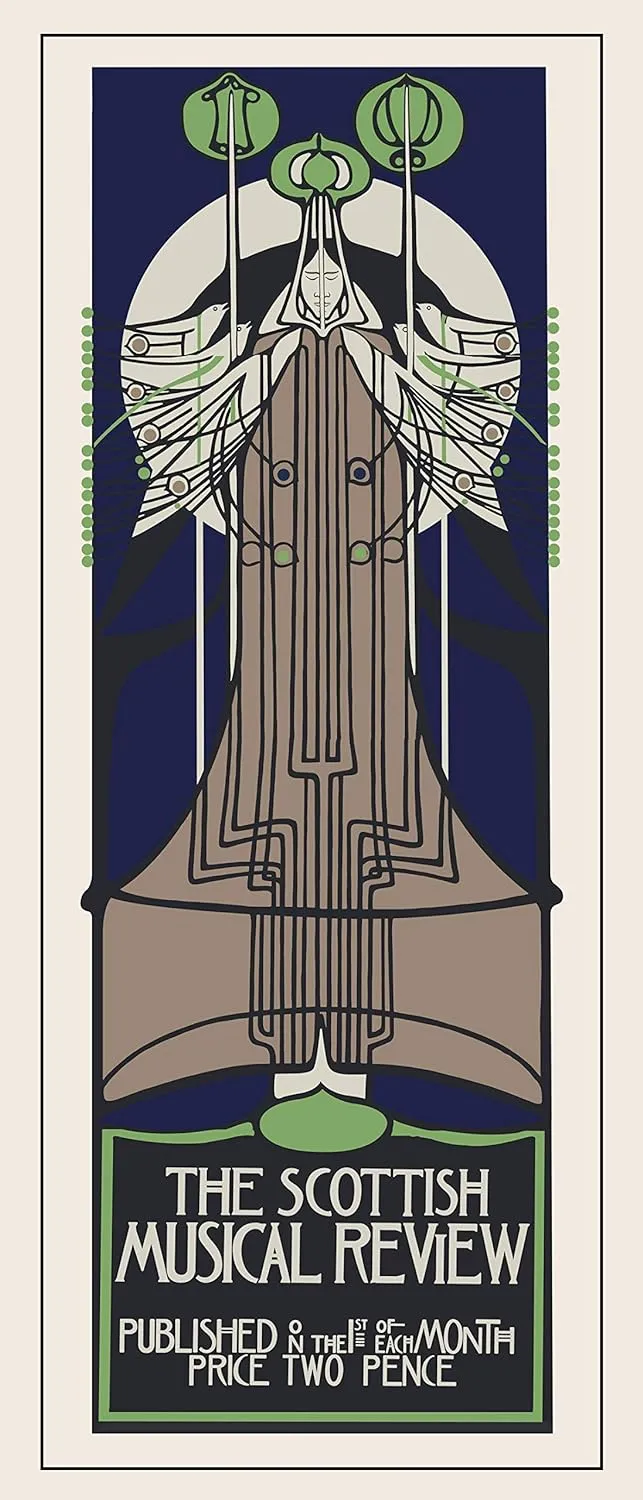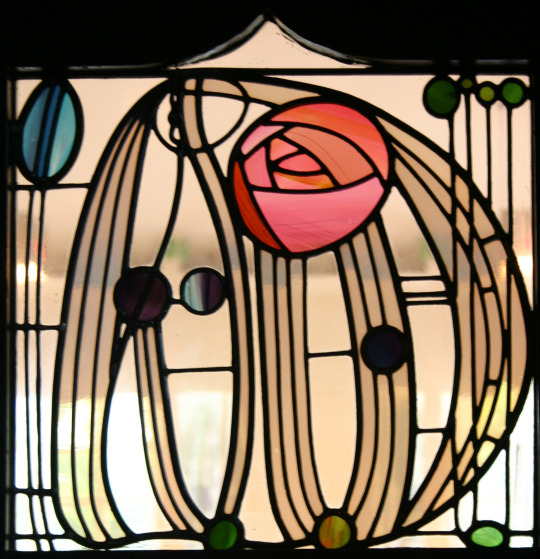#charles mackintosh
Explore tagged Tumblr posts
Text
Charles Rennie Mackintosh (British/Scottish, 1868-1928)


Charles Mackintosh was an art deco designer, architect, watercolourist, and painter.

The newly restored Willlow Tea Rooms contain furnishings designed by Mackintosh and his wife, Margaret, as well as light fixtures and even cutlery.


Charles, his future wife Margaret, James Macnaire and Margaret's sister Frances Macdonald worked as a team to encorporate the fusing of Art Deco with elongated forms, flowing lines, restrained color, symbolism, geometric patterns, and emphasis on the rectilinear. This unique style became known as the Glasgow Style.

Wall Panel for the Dug-Out (Willow Tea Rooms, Glasgow)
#art#design#art deco design#glasgow style#charles mackintosh#scottish artist#architect#willow tea rooms#the four#interior design#19th-20th century design#artwork#stained glass design#sassafras and moonshine blog
13 notes
·
View notes
Text
Charles Rennie Mackintosh (Scottish artist, 1868 – 1928)

Pink flowers, 1920, Charles Rennie Mackintosh (Scottish, 1868-1928).
51 notes
·
View notes
Text

Anemone and pasque flowers; Charles Rennie and Margaret Mackintosh
76 notes
·
View notes
Text

Charles Rennie Mackintosh | Duille
76 notes
·
View notes
Text




oh to be a fly in the wall during drivers' briefings
#iremember when they used to broadcast it 😭#charles leclerc#lewis hamilton#lissie mackintosh#f1#formula 1#gifs
745 notes
·
View notes
Text

Charles Rennie Mackintosh (1868-1928), 'Harvest Moon', 1892 Source
180 notes
·
View notes
Photo

"The Boulders" (c.1925) by Charles Rennie MacKintosh
#geometric#blue#hunterian art gallery#1920s#illustration#boulders#landscape#gray#charles rennie mackintosh#green#watercolor#british art#1925
27 notes
·
View notes
Photo

Charles Rennie MacKintosh (Scottish, 1868 - 1928)
68 notes
·
View notes
Photo

Charles Rennie Mackintosh, ‘Pinks’ c 1923. Watercolour. Scottish artist.
#charles rennie mackintosh#pinks#c 1923#watercolour#painting#art#scottish artist#floral#bouquet#flowers
23 notes
·
View notes
Text

Charles Rennie Mackintosh - THERE IS HOPE IN HONEST ERROR
32 notes
·
View notes
Text

The Fort, Charles Rennie Mackintosh, c.1926
85 notes
·
View notes
Text

Charles Rennie Mackintosh
Dianthus, Mont-Louis, 1925
70 notes
·
View notes
Text

Charles Rennie Mackintosh | Duille
37 notes
·
View notes
Text
1920s
1920s Fashion

For our third fashion history lesson, we studied the 1920s and Art Deco. The 1920s was an incredible decade that changed fashion as we know it. Skirt lengths shortened and women were finally liberated from the dreaded corset. The silhouette became more rectangular, undergarments were abandoned and women showed no cleavage. However, the waist was still aparent at the start of the decade.
By 1923, the waist had dropped, women became more flat chested and embroydery was heavy and glamorous. Fabrics such as sheer and chiffron were used (see through fabrics).
La Garconne

French for the bachelor girl, this word was used as a derogatory word by the elderly and a complement by the young. It was used to describe rebellious, tom boys with short hair and who wore men's clothing. They took part in pre-marital sex and other 'rebellious' activities.
By 1924, trousers were boudoir attire. For example, Paul Poiret's satin pajamas.
During this time, women began to reapply their makeup in public. This wouldn't have been allowed 20 years prior.
Despite the liberation of the corset, some women still used them to make their busts look flat. This was achieved by the freedom corset.
Menswear

The Prince of Wales became the 'it boy' for men's fashion. He was an idol, making fair Isle knits fashionable, and others such as: loose fitting tailoring 'bum freezer'; white flannel trousers and blazers; checkards; stripes; plaid. In 1925, the Oxford stripes became the trending trousers type. Loose fitting that had an average size of 40 inches! Despite the change of fashion from formal to casual, evening wear for men was still black tie and tails.
Lucian Lelong 1889-1958

Known as the man who saved Paris, Lelong stopped Hitler from moving Haute Cauture to Germany during the Second World War. Born into a family of designers, Lelong started a fashion business. He was a very smart business acumen. Unfortunately, he had to go to war. But once the war was over, he came right back into the fashion business. His business flourished with 1200 staff. Lelong was influenced by sport, due to this his designed are associated with fluidity. His dressmaking became engineering; he was a great innovator. Not to mention his 40 fagrances.
He developed the talent of up and coming designers, for example, Christian Dior. And in 1948, after nearly 30 years, Lelong closed his house for good.
Jean Patou 1887-1936

Not only a business man but also a ladies man. The two things Patou loved was women and business. That much so, he opened a dress shop after the First World War. He named it the House of Patou and got his family to work for him. Patou was inspired alot by Russian and Eastern influence, including his love of fur. He brought mens fabric into womens sportswear; similar to Coco Chanel. Patou saw trends like cubism and art decor, so used these in his work. Jean Patou did many iconic and unique things, such as; the first person to brand his work; brought over American models to work for him; created the most expensive perfume at the time, using 10600 jasmine flowers and 336 roses; created mens silk ties from biased cutting waste.
Gabrielle Bonheur Chanel (Coco Chanel) 1882-1971

Chanel did not start off wealthy, she was poor and didn't like her background. However, she lived a good life, despite the fact her mum died when she was 6. She lived and grew up in a nunnery making hats. Chanel was the first designer to create womens jersey taken from men's underwear. She paved her way into fashion by using sex and her sexuality. Her house was established at 31 ru cambon in 1909. At the time, Chanel No.5 was one of the best selling fragrances in the world! And the interlocking 'C's are the most famous fashion logo.
Art Deco

The Art Deco period is a movement in the decorative arts and architecture, originating in the 1920s in France after the First World War. It was developed into a major style in western Europe and United States during the 1930s. It was graphic, strong patterning with rich Egyptian colours; exoctic. For example:

Hoover factory, London 1932-1935

Chrysler building NYC.
An example of an Art Deco artist was Charles Rennie Mackintosh.

#fashion#art deco#1920s fashion#1920s#chanel#charles rennie mackintosh#history#fashion history#historical fashion
17 notes
·
View notes

